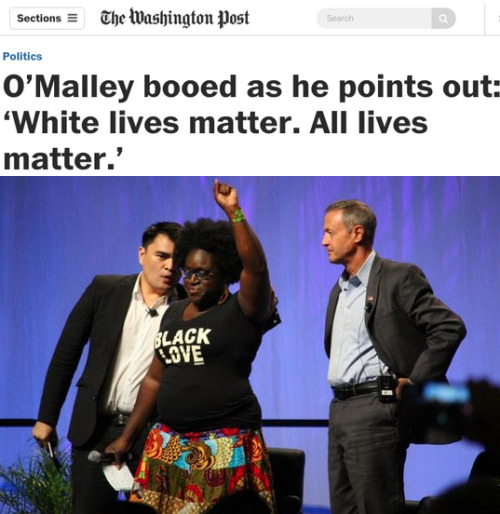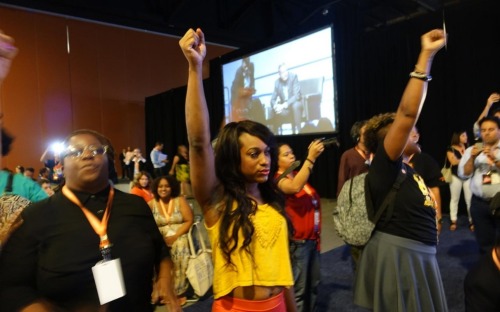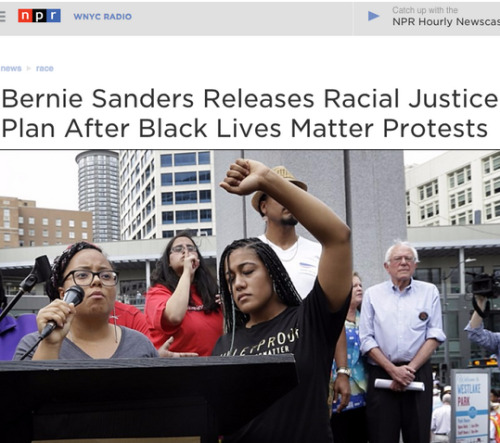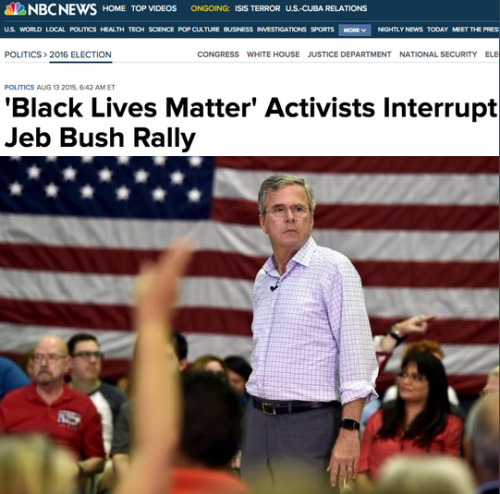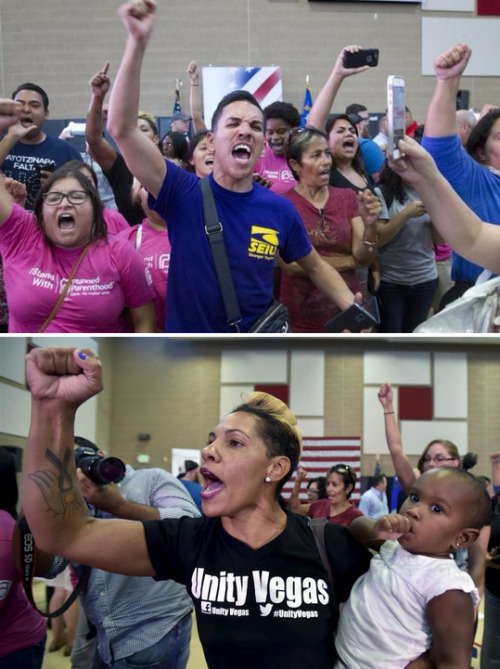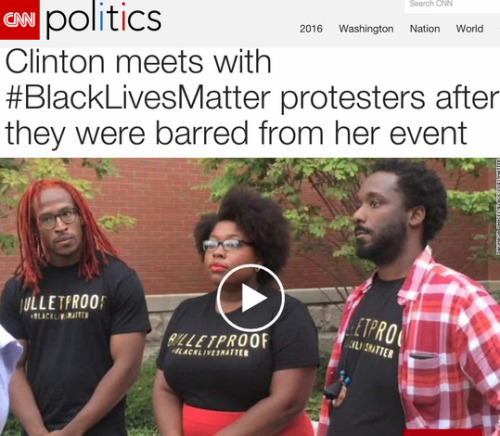note-a-bear:dippednv8splash:thechanelmuse:From TIME: “’Black Lives Matter’ is not an agenda. It’s no
note-a-bear:dippednv8splash:thechanelmuse:From TIME: “’Black Lives Matter’ is not an agenda. It’s not a catchy slogan for political points. It’s a movement that is trying to save the lives of those who live in fear every single day. Those who ignore race issues are standing by as our fellow men and women fall in the streets, in their cars, in the prison system, and in their own homes and neighborhoods. Nothing matters as much as life itself. Issues such as the economy, education, and the military are all very important, but as long as many white people continue to focus on those issues before they get around to addressing the issues of race, those advocating for “Black Lives Matter” have to force the microphone from their hands.”From Think Progress: “If there’s one message Black Lives Matter activists want to send to the presidential candidates running for the White House in 2016, it’s that they want police violence and racial disparities in policing to be acknowledged and addressed. But how exactly they communicate that message to politicians, organizers said, is less important.”Black Lives Matter co-founder Patrisse Cullors to Maritn O’Malley at Netroots townhall meeting: “I want to hear concrete actions. I want to hear an action plan. And we want to hear it from Bernie Sanders too.”Tia Oso who overtook the stage at the Netroots town hall meeting and interrupted Democratic presidential candidate Martin O’Malley: “We said we’re definitely going to do an interruption, not just a demonstration in the space. We’re going to try to make sure that everyone can hear us, which is why I asked for a microphone. We didn’t want it to be misconstrued as heckling, even though it was. Strategically, we were thinking about how to hold the space and make sure we put everyone’s attention on the issue. There are so many different things that need to happen and so many different types of meetings and so many different levels and tactics and strategies that have to be employed to make a difference. So sitting down, talking, and having a nice meeting is definitely a part of it. And then also getting out in the streets and making some noise and disrupting daily life is also 100 percent as legitimate a part of it and necessary.”Tia Oso also penned an article for Mic on why she interrupted the stage:“… the most important and urgent issue of our day is structural violence and systemic racism that is oppressing and killing black women, men and children. This is an emergency. […] I recognized the opportunity that I had to change this narrative. I, along with the 50 other black organizers attending Netroots Nation 2015, decided we would use the platform of the Presidential Town Hall to demand that former Democratic Gov. Martin O'Malley and Sen. Bernie Sanders (I-Vt.) #SayHerName and address the crisis of structural racism and their plans to make sure that Black lives matter should they be elected president.”Marissa Johnson who overtook Bernie Sanders’ stage at the Seattle rally w/ fellow activist Mara Willaford explains why:“Here’s the thing. I saw the video that happened at Netroots just like everybody else. In that video, Patrisse says very specifically to [Martin] O’Malley: ‘You and every other Democratic presidential candidate should expect to be confronted or interrupted until you put forth solid proposals, no matter where you go in this country.’ So I heard that and when the news dropped that [Bernie] Sanders was going to be coming to Seattle, there wasn’t even a conversation that needed to be had. It was ‘that’s the status quo for presidential candidate.’ He hadn’t, at that point, put out a criminal justice reform plan, like O’Malley had. So, it was very clear.Going after Sanders is super important because Sanders is supposed to be as far left and progressive as we can possibly get, right? In Seattle political context, I know that really well. We have hoards and hoards of white liberals and white progressives, and yet we still have all the same racial problems. For us locally, in our context, confronting Sanders was the equivalence of confronting the large white liberal democrat leftist that we have here in Seattle, who not only have not supported BLM (Black Lives Matter movement) in measurable ways, but is often very harmful and upholding white supremacist society that we live in. That’s why we felt the need to address him and his supporters.”From Seattle’s Kiro TV Channel 7 Eyewitness News“Bernie Sanders’ campaign staff did not want police to remove the two Black Lives Matter protesters from the stage last weekend after they interrupted Sanders’ planned speech, a Seattle police spokesman said Monday.”From New Republic“Black Lives Matters protesters are not the problem. Ever since their disruptive July protest at Netroots Nation, the progressive activist and media conference, it has been apparent that Black Lives Matter and those which partner with it are not simply looking for words from candidates reassuring brutalized communities of color. They sought detailed proposals from the two Democratic hopefuls on stage, Sanders and former Maryland governor Martin O’Malley. O’Malley, whose awful criminal justice record during his Baltimore mayoralty has ruined his reputation with many black voters, responded more than one week ago with a comprehensive, if perhaps unrealistic, set of reform proposals and a call for a constitutional amendment to formally grant (and thereby protect) the right to vote.”From Vox: “Black Lives Matter activists are treating this as a prerequisite: Anyone running for the Democratic presidential nomination in 2016 should have put a lot of thought into racial justice and have concrete ideas for how to fix it. So far, it looks like they’re achieving that goal (although Hillary Clinton has yet to put out a platform). But with a long way between now and the end of the Democratic primary — since the Black Lives Matter movement isn’t endorsing a candidate — activists’ relationship with Sanders, O'Malley, and (eventually) Clinton is going to be determined not just by the content of the candidates’ platforms but by the content of their records. Sanders lists things that should happen; O'Malley explains how he’d make them happen. It’s up to activists to decide how much candidates who helped create the problem of mass incarceration (which certainly includes Clinton and O'Malley) have to do to prove they’re committed to ending it. Sanders lists things that should happen; O'Malley explains how he’d make them happen. O'Malley’s platform, which was released July 31, is much more specific than Sanders’. When the Sanders’ platform first came out on August 9, the day after he was interrupted by Black Lives Matter protesters in Seattle, it was described as a “draft,” so his campaign might have more details forthcoming. Right now, it’s a collection of statements about things “we” (society and/or the government) need to do; how the Bernie Sanders administration would make these things happen isn’t always clear.Even if Black Lives Matter activists hadn’t been explicitly calling for O'Malley and Sanders (as well as Hillary Clinton) to release criminal justice platforms, you’d still be able to see the movement’s influence. Both platforms take it as a given that police use of deadly force is out of control, and that the federal government needs to step in.From Business Insider:Black Lives Matter activists have begun to turn up the heat on Republican candidates.Worth the read. Important stuff here.BLACK WOMEN CHANGING THE WORLD -- source link
Tumblr Blog : thechanelmuse.tumblr.com
#blacklivesmatter
